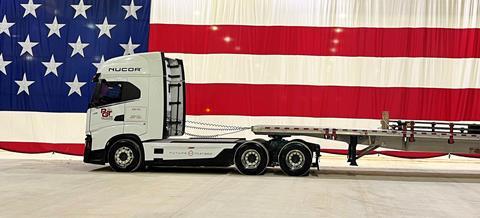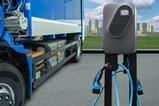PGT Trucking, a flatbed transportation firm, successfully delivered its first-ever shipment of low-greenhouse-gas (GHG) intensity steel using Nikola’s Class 8 battery-electric vehicle.

The steel was transported from Nucor’s new plant in Brandenburg, Kentucky, to a nearby fabricator. This initiative is part of PGT Trucking’s sustainable shipping solutions programme, aimed at reducing emissions and promoting environmentally friendly practices in the transportation industry.
To commemorate this historic achievement, PGT Trucking, Nikola, and Nucor organised an event at Nucor Brandenburg, inviting team members, media representatives, and local officials.
“PGT Trucking is proud to partner with companies like Nikola and Nucor who share a common vision and commitment to a greener future,” said Gregg Troian, PGT Trucking President. “We are confident that these relationships will help guide PGT’s Future of Flatbed® initiatives, allowing us to reach our goal of a 35% reduction in emissions of our company-owned equipment by the year 2025.”
The event featured formal presentations from key figures including Gregg Troian, Jason Roycht (Nikola Global Head, FCEV Market Development), Al Behr (Nucor EVP of Plate & Structural Products), and Johnny Jacobs (Nucor Steel Brandenburg GM). Attendees were then taken on a guided and interactive tour of the Nikola Class 8 battery-electric semi-truck and the charging station.
“For more than five decades, Nucor has been built on the sustainable model of producing steel with a low carbon footprint,” stated Behr. “Even though we are one of the cleanest steelmakers in the world, we know we need to continue to lower our greenhouse gas intensity. This partnership with PGT and Nikola is just one example of the innovative ways Nucor is working to reduce its carbon emissions.”
Nucor has taken proactive steps to facilitate the use of battery-electric flatbed trucks by installing charging stations at multiple mills, including the Brandenburg facility. The implementation of these charging stations is expected to contribute to a 40% reduction in carbon emissions and a 20% savings in energy costs per trip for short-haul deliveries.
A study conducted by the North American Council for Freight Efficiency (NACFE) further supports the potential impact of battery-electric trucks on carbon emissions. According to the study, replacing 50% of heavy-duty regional haul tractors with battery-electric trucks could result in an estimated annual savings of 29.4 million tonnes of carbon dioxide equivalent for the industry.















